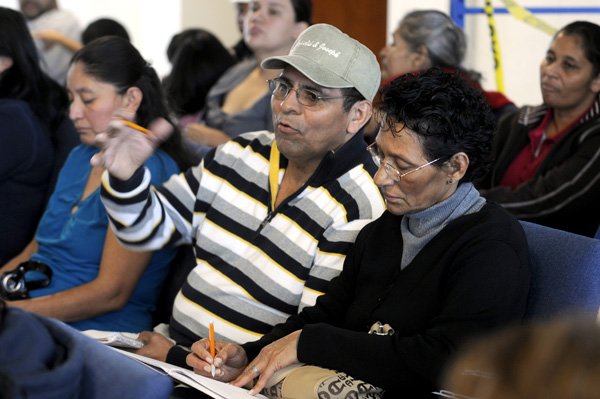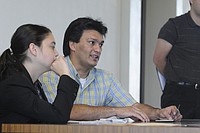Editor's note
The Springdale Rodeo Center at 1423 E. Emma Ave. will be open for early voting from 11 a.m. to 6 p.m. Monday through Friday through Oct. 29. A item in Sunday’s edition included an incorrect time. Also, Saturday early voting is available at the Washington County Courthouse from 10 a.m. to 4 p.m. Saturday. That opportunity was omitted from Sunday’s information and has been updated here.
Early voting locations and times
Benton County
County Clerk’s Office
215 E. Central Ave. in Bentonville
-
County Clerk’s Office
300 W. Poplar St. in Rogers
-
County Clerk’s Office
707 S. Lincoln St. in Siloam Springs
-
Riordan Hall
3 Riordan Drive in Bella Vista
-
Hours:
Monday through Friday: 8 a.m. to 6 p.m.
Saturday: 10 a.m. to 4 p.m.
* The Bella Vista location will be closed Nov. 1
***
Washington County
Washington County Courthouse (Quorum Courtroom and County Clerk’s Office)
280 N. College Ave. in Fayetteville
Monday through Friday: 8 a.m. to 6 p.m.
Saturday, Oct. 30: 10 a.m. to 4p.m.
Monday, Nov. 1: 8 a.m. to 5 p.m.
-
Sprindale Rodeo Center
1423 E. Emma Ave. in Springdale
Monday through Friday: 11 a.m. to 6 p.m.
Saturday, Oct. 23 and 30: 10 a.m. to 2 p.m.
-
For more information about the Nov. 2 general election, go to www.nwaonline.com/vote.
Voting on Nov. 2 is from 7:30 a.m. to 7:30 p.m.
By The Numbers
1,086 • People who earned their green card and permanent resident status in 2009 in the metropolitan statistical area of Northwest Arkansas and McDonald County, Missouri.
686 • Number of those people who came from a Latin American country.
602 • Number of people in 2009 who were naturalized as citizens.
380 • Number of those who were Hispanic.
***
Washington County
747 percent • The increase in Hispanic population between 1990 and 2000 from 1,526 to 12,931 residents.
107 percent • The increase from 2000 to 2008, to 26,723 residents.
13 percent • Hispanic population of the county.
33 percent • Hispanic population in Springdale.
***
Benton County
891 percent • The increase in Hispanic population between 1990 and 2000, from 1,359 to 13,470 residents.
127 percent • The increase from 2000 to 2008, to 30,641 residents.
14 percent • Hispanic population of the county.
31 percent • Hispanic population of Rogers.
-
Source: Pew Hispanic Center, Department of Homeland Security and U.S. Census Bureau.
NORTHWEST ARKANSAS — Daniel Diaz was nervous as he set up chairs for Hispanic permanent residents seeking U.S. citizenship in Springdale earlier this month. He didn’t know how many people would show up but was thrilled when more than 30 arrived.
Diaz, civic engagement coordinator for the Hispanic Women’s Organization of Arkansas, hopes to increase civic participation among Hispanics in Northwest Arkansas. Turnouts are key to that effort, he said.
While the Hispanic population has grown rapidly in some Northwest Arkansas communities, there has not been a corresponding growth in Hispanic officeholders. Events like the one at the Family Resource Center in Springdale are a good first step in motivating voters and potential candidates, Diaz said.
“You'll be able to have your voice heard and have more rights, and you'll be able to help the community a lot more with your citizenship,” he said.
One reason for a lack of Hispanic participation in local politics is that people from other countries need time to work their way into an unfamiliar political system, said Janine Parry, a political science professor at the University of Arkansas. Political scientists use the second and third generations as a marker for political participation, Parry said. That means there could be more participation by Hispanic groups locally in another 20 years, she said.
Local organizations such as the one Diaz belongs to and the League of United Latin American Citizens want more participation now.
Only a few Hispanics have held public offices in Northwest Arkansas, said Jose Gomez, the league’s state director. He could only recall one, Alex Vasquez, who has been elected recently. Vasquez was elected to the Northwest Arkansas Community College Board of Trustees in 2009 for a five-year term.
Washington and Benton County governments have no elected Hispanic officials. The same goes for city governments and school districts in Fayetteville and Springdale.
Encouraging more Hispanic residents to register to vote is an important step to electing Hispanics officials, Gomez said.
“When you have a quantifiable mass of official Hispanic voters, then that trend comes along,” he said.
This year, the league and other organizations have registered 5,000 new voters, Gomez said.
Many Hispanic residents are first generation immigrants and first must jump the hurdle of gaining their permanent resident status before even applying for citizenship and registering to vote, Diaz said. The process could take several years, he said.
Northwest Arkansas is on the right track for gaining Hispanic political representation, said Juan Andrade, president of the U.S. Hispanic Leadership Institute.
“The main ingredient the community needs to allow itself is time and to try to conceptualize a vision on where it is and where it wants to be and map out a strategy,” Andrade said. “It will take us about 20 years in the South, not just in Arkansas but other states in the South, for us to be where we want to be.”
At the clinic in Springdale, Ines Melgar-Hernandez and his wife, Olimpia Melgar, took notes as they received tips from immigration attorneys for the citizenship process. Originally from La Ceiba, Honduras, Melgar-Hernandez has lived in Springdale for five years. Both his sons are citizens and regularly vote, he said.
Along with the challenges of learning a new language, Melgar-Hernandez said he is studying American history.
“Lately, since I’ve been studying for the citizenship test with my wife,” he said in Spanish. “We have learned about the people who lead Arkansas. We do know a little about our local senator. It's interesting and little by little, we’re learning more.”


